The Innovators: Stax Artist Spotlights
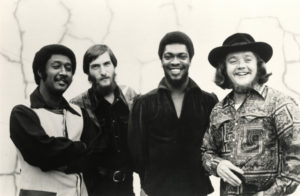
Booker T. & The M.G.’s. Photo Courtesy of the Stax Archives.
As Stax’s house band, Booker T. & the M.G.’s were essential in creating the highly influential “Memphis Sound” and setting the stylistic standard for ’60s soul. While their tight musicianship can be heard on hundreds of records by luminaries like Otis Redding, Carla Thomas, Sam & Dave, and Johnnie Taylor, they were equally successful as an independent group. In less than a decade, the prolific instrumental powerhouse released 11 albums and one of the most iconic soul tracks ever. Along the way, they broke barriers as one of the South’s first integrated acts.
Members of the quartet came together during the label’s earliest days, when Stax was still known as Satellite Records. Keyboardist Booker T. Jones was a high school student when he played his first session, while, at 20, guitarist Steve Cropper was already a seasoned employee—working behind the counter at the label’s record shop and performing in its studio as a member of The Mar-Keys (Stax’s first house band). Drummer Al Jackson Jr. and bassist Lewie Steinberg (later replaced by Mar-Keys member Donald “Duck” Dunn)—who joined soon after—knew Jones from the local club scene.
Over the next year, the band found their groove in the studio. One afternoon in 1962, a session ended early due to an unruly singer. With time on their hands, they began a bluesy jam. Stax president and producer Jim Stewart, who sat behind the console, liked what he heard and hit record. The result was “Green Onions.” He released it as a single, with B-side “Behave Yourself,” that spring.
What began as a casual session turned into an internationally beloved sensation and one of the most popular instrumental songs ever. By the fall of 1962, “Green Onions” had landed at the top of Billboard’s R&B singles chart and at No.3 on the Hot 100. It also marked the title track of the group’s first album (and Stax’s first-ever LP), released that October.
The band followed with Soul Dressing (1965), And Now!, In the Christmas Spirit (both 1966), and 1967’s Hip Hug-Her—the title track of which made the R&B Top Ten and the Pop Top 40. Beginning with their sixth album, 1968’s Doin’ Our Thing, the quartet took a more wholistic approach, stepping in as producers. They also branched out into film music, scoring the soundtrack to 1968’s Uptight—which spawned the global hit, “Time Is Tight.” 1970’s McLemore Avenue, meanwhile, paid tribute to The Beatles’ Abbey Road. In a cheeky nod to the original, the group named their supremely funky record after the Memphis street where Stax stood.
Throughout their years together, Booker T. & the M.G.’s also expanded their fanbase outside of the studio. In the mid-’60s, they joined the European “Stax/Volt Revue” tour and played alongside the era’s biggest rock acts at Monterey Pop (they also backed Otis Redding during his legendary appearance at the 1967 festival). In 1970, they opened for Creedence Clearwater Revival at the Oakland Coliseum.
A year later, the band released Melting Pot, which marked the final studio album to feature the classic Booker T. & the M.G.’s lineup. The collection of expansive jams found the group pushing the boundaries of their sound, but after nearly a decade together, Jones, Cropper, Dunn, and Jackson were eager to pursue new ventures.
Booker relocated to California, where he stayed busy with solo projects and found success collaborating with artists like Stephen Stills, Neil Young, Willie Nelson, and Ray Charles and producing albums for Bill Withers. Cropper set up his own recording studio, where he produced albums for Rod Stewart, Ringo Starr, José Feliciano, and John Prine, among others.
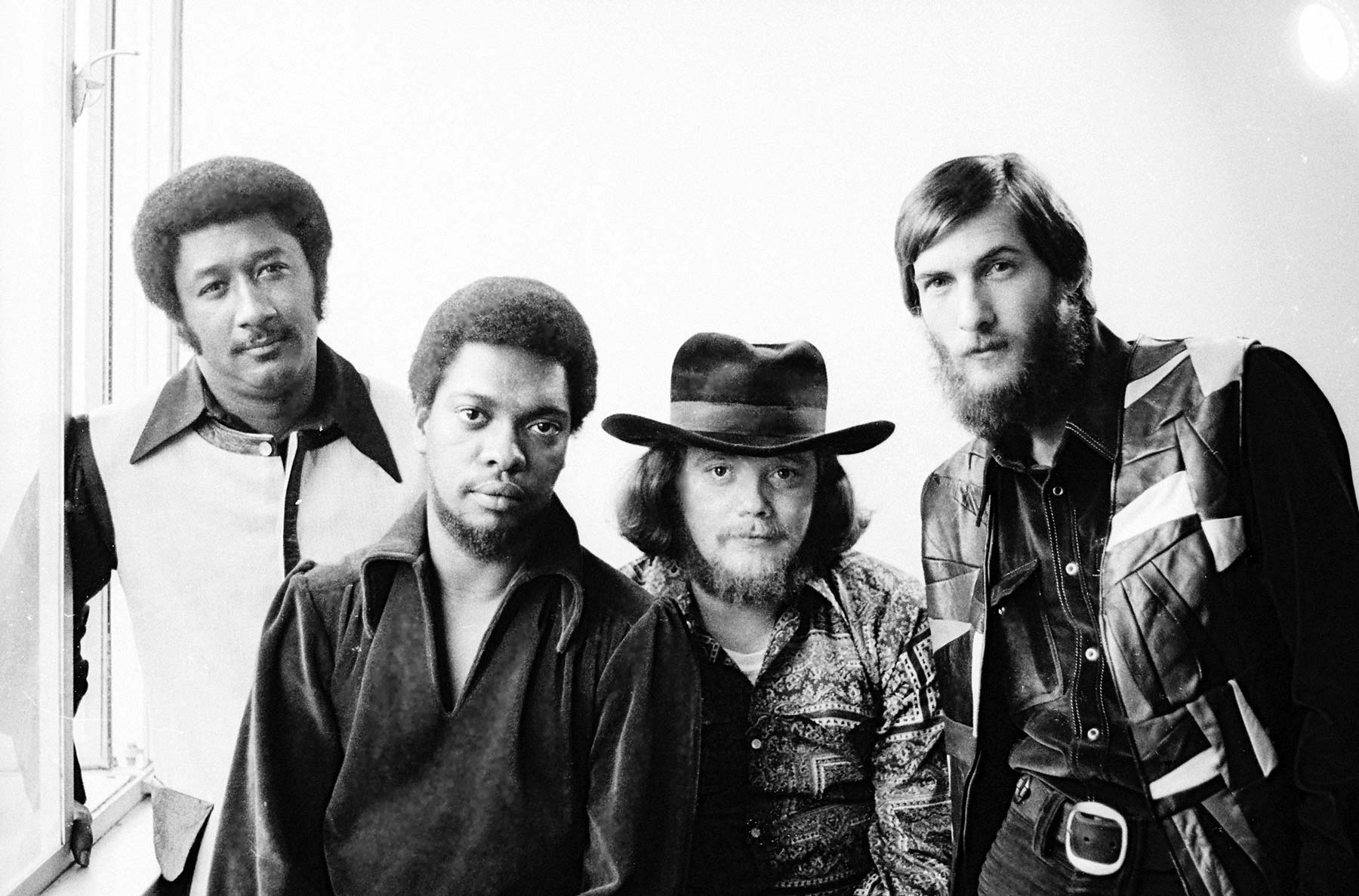
Booker T. & The M.G.’s. Photo Courtesy of the Deanie Parker Collection.
Jackson continued to work as a highly coveted percussionist, performing with legends like Elvis Presley, Aretha Franklin, Donny Hathaway, and Eric Clapton. He also struck up a fruitful collaboration with Al Green, co-writing “Let’s Stay Together” and “I’m Still in Love with You,” and produced songs for blues icon Albert King. Tragically, in 1975, he was shot and killed during a burglary. At the time of his death, the 39-year-old was in the process of reuniting with his old band.
Over the following years, the remaining musicians continued to collaborate on each other’s projects and, in 1994, they released a new album, That’s the Way It Should Be. Eight years later, Dunn passed away while on tour with Cropper and fellow Stax alum, Eddie Floyd. Ranked among Bass Player’s list of “The 100 Greatest Bass Players of All Time,” Dunn also enjoyed a fruitful career beyond the M.G.’s, performing with Muddy Waters, Levon Helm, and Eric Clapton, as well as Stevie Nicks and Tom Petty on their 1981 hit, “Stop Draggin’ My Heart Around.” Along with Cropper, Dunn appeared as himself in the top-grossing film, The Blues Brothers.
In the history of recorded music, only a handful of session bands have recognizable names—The Memphis Horns (who regularly joined Booker T. & the M.G.’s in the studio), the Muscle Shoals Rhythm Section, and The Wrecking Crew—among them. Even fewer have become best-selling, standalone acts. Booker T. & the M.G.’s set the gold standard and were widely recognized for their impact throughout the decades. In 2007, they were presented with the GRAMMY® Lifetime Achievement Award, while they were inducted into the Rock and Roll Hall of Fame in 1992, the Memphis Music Hall of Fame in 2012, and the Blues Hall of Fame in 2019.
Today, at 76 and 79, respectively, Booker T. Jones and Steve Cropper continue to enjoy active careers.
STAX FAX
-
- Booker T. Jones was just 17 years old when he and Steve Cropper played on one of Stax’s (then Satellite Records) earliest singles: 1960’s “’Cause I Love You”—a duet between Rufus Thomas and his daughter, Carla. While Jones was known for playing the Hammond organ, this session found him performing the saxophone. Two years later, Green Onions would mark Stax’s debut full-length release.
-
- It was long believed that “the M.G.’s” in the name Booker T. & the M.G.’s stood for “Memphis Group.” According to Stax producer Chips Moman (and later confirmed by Jones and Cropper), the band was actually named after the British sports car. Music historian Rob Bowman argued that the label was concerned about trademark infringement, and thus pushed the “Memphis Group” narrative. Dunn once playfully offered another interpretation…declaring that it stood for “Musical geniuses.” He wasn’t wrong!
Essential Tracks
Green Onions
Time Is Tight
Groovin'
READ MORE
The Innovators: Stax Artist Spotlights ARCHIVE
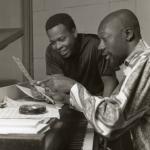
Stax Records — After 1975
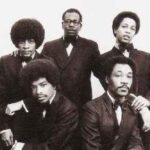
Ollie & The Nightingales
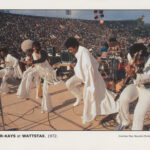
The Bar-Kays

24-Carat Black

The Temprees
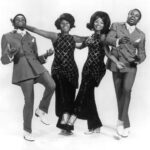
The Soul Children

The Mar-Keys

Delaney & Bonnie

Stax Groups – The Astors, Jeanne & The Darlings & the Charmels

The Mad Lads

The Dramatics

The Emotions

Johnnie Taylor
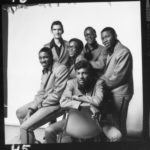
The Bar-Kays

Otis Redding

The Dramatics
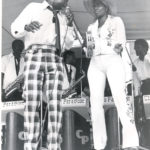
RUFUS & CARLA THOMAS
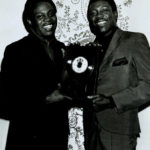
Sam & Dave

The Emotions


